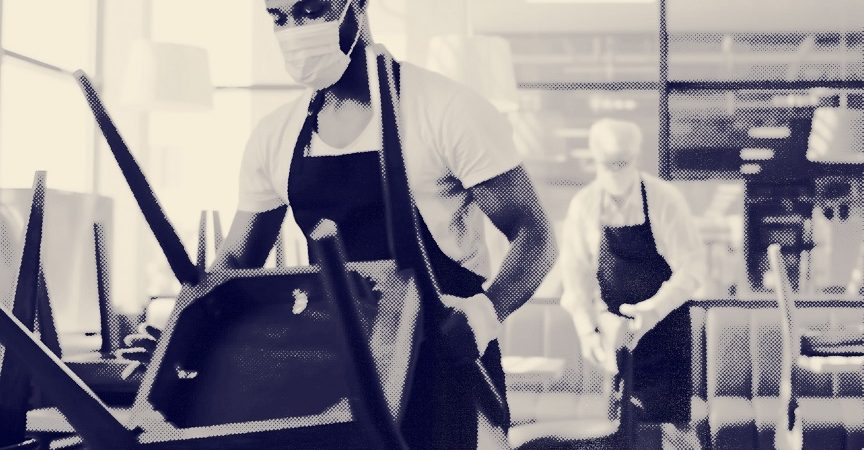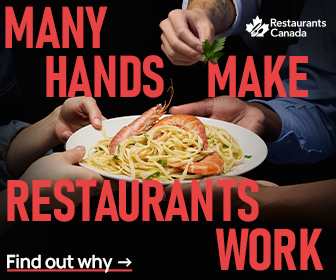Care is the Currency of our Times: Leading your team – and yourself – through turbulent waters
Post-pandemic, one of the most important employer brand differentiators will be the actions taken by leadership during a time scarred by layoffs and closures.
Facing the urgent necessity of labour reductions is a devastating, gut-churning moment many operators have had to meet head on over the past year. In some ways, the universal context of the pandemic may have helped with these conversations, if only because every employee would have had some awareness of the heightened probability of layoffs, and some may even have taken some solace in knowing their job was a casualty beyond anyone’s control.
Context aside, no owner or manager is automatically off the hook.
The quality of the communication of ‘bad news’, and what happens in the hours, days, and months afterward are important and often overlooked leadership opportunities. Forward-thinking operators and foodservice companies are seeing beyond the challenges of the current workforce landscape and laying the groundwork for a bigger, better return to normal.
The restaurant industry is interconnected. People talk. Leaders should assume that word of company strength or vulnerability is circulating freely as employee social groups both within and beyond their company connect to share their concerns and career prospects. Taking the time to care for and nurture your workplace culture will help ease the return to normal and restore companies to a place of health and profitability.
Employees are brand avatars and ambassadors. How you treat them matters now more than ever. Peer-to-peer and peer-to-consumer stories of employer thoughtfulness and consideration will help move strong foodservice brands forward. We are in a unique cultural time, where a company’s emotional intelligence and compassion – kindness – are more connected to the bottom line than ever.
But what about the leaders themselves? Even when the cause is beyond their control, it’s emotionally difficult for leaders and managers to carry out dismissals. The weight of feeling you’ve failed or let someone down takes a heavy toll. Taking the time to communicate and support both affected and unaffected staff in a clear, compassionate, and thoughtful way – doing your best – can help mitigate the emotional cocktail that comes with causing another person pain or stress. Don’t avoid difficult conversations, embrace the opportunity to connect meaningfully and sincerely with staff, treating them as you would like to be treated. This is the currency of the times.
Effective support for staff affected by layoffs, dismissals, or business closures:
1. Transparency
As much as it’s human nature to want to take the edge off a tough conversation and ‘make everything okay’, being open and honest about the likely duration or permanence of a layoff is crucial.
When employment is suspended or stops, employees need and deserve to make often immediate career and life changes. Unless an employee is being terminated for cause, your first duty is to them.
2. Preparation
When an employee is dismissed, they should have everything they need to move on. Make sure any outstanding payments, ROE, and other employment paperwork are ready for them at the moment. It is not fair to expect employees to wait or follow up after dismissal.
3. Listening
Some people accept bad news in silence, leaving the conversation (and workspace) as quickly as possible, while others need and appreciate the time to ask questions, seek additional information, or emote. Often, an employee will not assign ‘blame’ for dismissal on the messenger and may want to engage in a longer conversation as they work through the change in their situation.
4. Support
Immediately after a dismissal conversation, ask if you can call a taxi to help the affected employee home. Each person is unique and will react differently. Some may be extremely upset. Recognize that, at the moment, routine activities like driving home may not be safe and provide safe transportation if possible.
Give dismissed employees a little time, then reach out to ask how they’re doing and if you/the company can help in any way. If the dismissal is a temporary layoff, be sure to keep the lines of communication open, both ways. Don’t assume employees who have been laid off do not want to hear from you, whether or not you are in a position to offer news on a return to work.
5. Connection
Too often, in an effort to get through a tough conversation, we make promises we do not keep. Promising to keep in touch with employees during layoffs and terminations and not following through may suggest that the employee was not actually valued by the company.
For some, this can damage self-esteem during a vulnerable time, particularly if a long period of unemployment follows. If you say you’ll stay in touch, do it. If you hope to restore employee roles when the business recovers, ask employees for their personal email address and send regular updates, or simply check in to see how they’re doing.
Strength in Open Communication:
The Charcoal Group
It’s surprisingly rare for a CEO to reach out to all customers, staff and stakeholders to air their thoughts and plans during tough times. That is precisely what Charcoal Group CEO Jody Palubiski did at the beginning of the pandemic. The Charcoal Group is the parent company of popular Ontario restaurants Beertown, Sociable, The Bauer Kitchen, Wildcraft, Moose Winooski’s and Charcoal Steakhouse.
He published an open, publicly available letter on their corporate website, A Letter from our CEO. The letter does not mince words about the severity of the times, but quickly pivots to reinforce the company’s confidence and resolve by announcing their Return to Operations Playbook. The Playbook is a strong statement of faith in the strength and value of hospitality built on the efforts of many and includes each of those people in the language that announces it. This is strong leadership, especially when the chips are down.
On top of that, Palubiski and his team made the tough business decision to close voluntarily to keep their team and community safe: “In the beginning, during the shutdown, our focus was on taking care of the team and each other. We worked hard to get ROEs out within 24 hours, along with information for employees to help them access available supports, services and grants. Along the way, we have provided budgeting, physical fitness and mental health resources in addition to weekly team fan-out phone calls. As time went on, our management team wondered whether or not staff wanted to hear from them so frequently, but staff reported actually missing out on the phone calls.”
Managers even offered to meet with employees who self-identified as struggling or isolated, with some meeting staff in shuttered restaurant locations, socially distanced. “We really doubled down on the importance of taking care of our people, asking, ‘How do we serve each other better?’ So, we started CG Family Dinners, where we all cooked the same meal together on a Friday night, sharing on social media. Recently, we invited three comedians to a Zoom stand-up show for the team on a Monday night. All that aside, I’d say the most important part is the weekly phone calls.”
Recently, the Charcoal Group engaged Counselling Collective to offer their management team accredited training on how to recognize any signs of emotional or mental troubles among furloughed staff and each other. Managers reported recognizing some of the symptoms and experiences within themselves, which could be as simple as how they’re practising self care – sleeping, eating, exercising, meditating, etc.
“The first shutdown everyone felt like we were all in this together. The second time around, those in the hospitality industry feel like they’ve been put out in a lifeboat all on their own,” says Palubiski, “But we’re here for each other.”
Palubiski is optimistic about Charcoal Group’s place within a new normal. “They say that difficult times are character building. I would say that difficult times are character revealing. The pandemic has put a lens on it. We know who we are and what we want to continue to be as employers, coworkers and colleagues as we move forward. We are a social society. I’m very confident that if we do all of the right things and take care of each other, when the doors open, we will flourish.”









